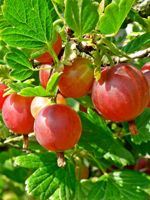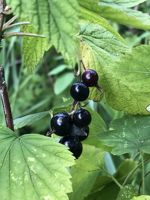Mon-Fri 9am - 5pm Mountain time
Sebastien Gooseberry vs American Black Currant
Ribes uva-crispa Sebastien
Ribes americanum
NOT AVAILABLE THIS SEASON - MIGHT RETURN
(new stock expected: fall of 2026)
CUSTOM GROW
Sebastien Gooseberry is a nearly thornless variety that produces medium-sized, red gooseberries. When the berries are fully ripe they are quite sweet and great for fresh eating. They can be stored for up to two weeks in the fridge. For baking and preserves, they are often picked when under-ripe when they are firm and tart. The general harvest period is anywhere from July to September.
Sebastien Gooseberry is a Canadian variety that was developed at the Agriculture and Agri-Food Canada research station in Ottawa.
Gooseberries are self-pollinating but planting with another variety will increase yields.
American Black Currant is a native deciduous shrub known for its clusters of small black berries that ripen in mid-to-late summer. The berries are edible and have long been used for fresh eating, preserves, and baking. They provide food for birds and mammals, and their fragrant spring flowers attract bees and other pollinators.
American Black Currant’s foliage serves as a host plant for butterfly species such as the Green Comma and Gray Comma, and its dense branching offers cover for wildlife. The shrub has traditionally been planted in shelterbelts, riparian buffers, and restoration projects.
Sebastien Gooseberry Quick Facts
American Black Currant Quick Facts
Toxicity: leaves are toxic to humans

